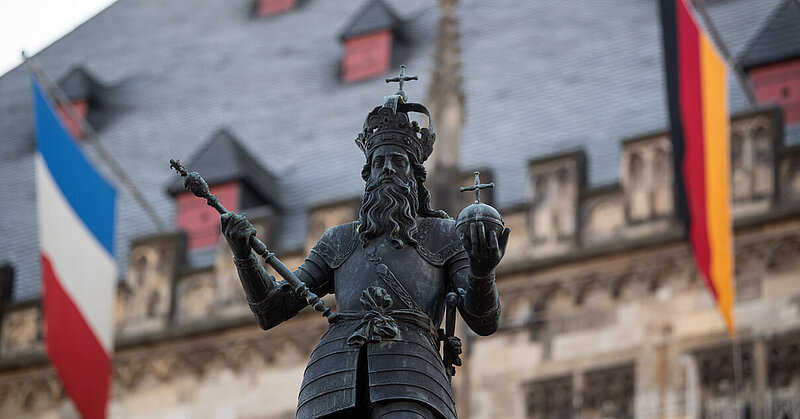
New Franco-German Aachen Treaty lacks ambition, says Henrik Enderlein in WiWo.
On 21 January 2019, French President Emmanuel Macron and German Chancellor Angela Merkel signed the Aachen Treaty - pledging to renew Franco-German cooperation as the driving force behind the European Union. The treaty comes at a challenging time for the European project, and aims to reaffirm the commitment of the two big countries in the heart of Europe, established under the historic Élysée Treaty of 1963. But the symbolic meaning goes further: Aachen was the seat of Charlemagne's empire twelve-hundred years ago, a territory comprised largely of today's founding countries of the European Union. Hertie School President Henrik Enderlein explains why the gesture remains mostly symbolic.
WiWo: Professor Enderlein, French President Emmanuel Macron and German Chancellor Angela Merkel are meeting in Aachen to sign a new Franco-German cooperation agreement, a move they want understood as something akin to the renewal of the 1963 Elysée Treaty between the two nations. Will this prove be a similarly important milestone for Europe?
Enderlein: The Aachen Treaty’s value is more symbolic than practical. There’s nothing really new or groundbreaking in the individual points of the treaty. They summarize initiatives we already know about and keep joint commitments to the lowest common denominator.
WiWo: What more would you have wished for in the Aachen Treaty?
Enderlein: Ambitious but concrete goals should have been set to further develop the Franco-German economic area, for example. What about a pledge for identical legislation to meet cross-border challenges like digitization, data protection or the ethical aspects of artificial intelligence? Why are there still differences in drug-approval processes? What about a commitment to a jointly regulated energy market? Where is the common approach to renewable energy? Germany and France will only truly be a common economic area and a single market when legal and regulatory boundaries become insignificant. The treaty could have laid down ambitious formulations and in so doing bound politicians to clear promises.
WiWo: But both states are reaffirming their wish to forge a joint corporate tax regime.
Enderlein: Many people now just roll their eyes in irritation when they hear this talk of the common consolidated corporate tax base. Experts have been meeting about the subject for two decades and nothing has happened. And they’re just trying to work out common rules for depreciation or definitions for profits and losses. They’ve not even broached the actual subject of taxation. Joint military procurement is also an infinitely thorny issue. Very little is happening here, even though closer cooperation – and standardisation – in the military sector would render many billions of euros in savings from efficiency gains.
WiWo: So the Aachen Treaty does not mark a step forward in any area?
Enderlein: The Treaty mainly contains vaguely formulated declarations of intent. That is not per se bad, but it does not show enough ambition. The preceding treaty, the Elysée Treaty of 1963, was a historical inflection point. Not only because it prepared the ground for the reconciliation of two nations who were at the time still deeply estranged from one another. But also because it formulated a common vision with great clarity. The signing of the Elysée Treaty by the two countries’ leaders made the unthinkable a concrete political task. Today's treaty should have done the same, albeit with the priorities of 2019. Seriously, will any historian look back on the Aachen Treaty in 50 years and call it a milestone?
WiWo: What if the relationship between the two countries doesn’t need a quantum leap?
Enderlein: It would be a big mistake to assume that. We urgently need to deepen political cooperation and to make the two economies genuinely interconnect. If that doesn’t happen, I fear we’ll see a creeping alienation between Germany and France, which would also be bad for Europe. Germany and France have always demonstrated a strong relationship on the red carpet. But purely symbolic gestures of that sort are no longer enough today.
Read the full interview in Wirtschaftswoche here.
Read an article quoting Henrik Enderlein in the Financial Times here.
Listen to an interview with Henrik Enderlein on German public radio DLF here.
More about Henrik Enderlein
-
Henrik Enderlein, Professor of Political Economy, past President
